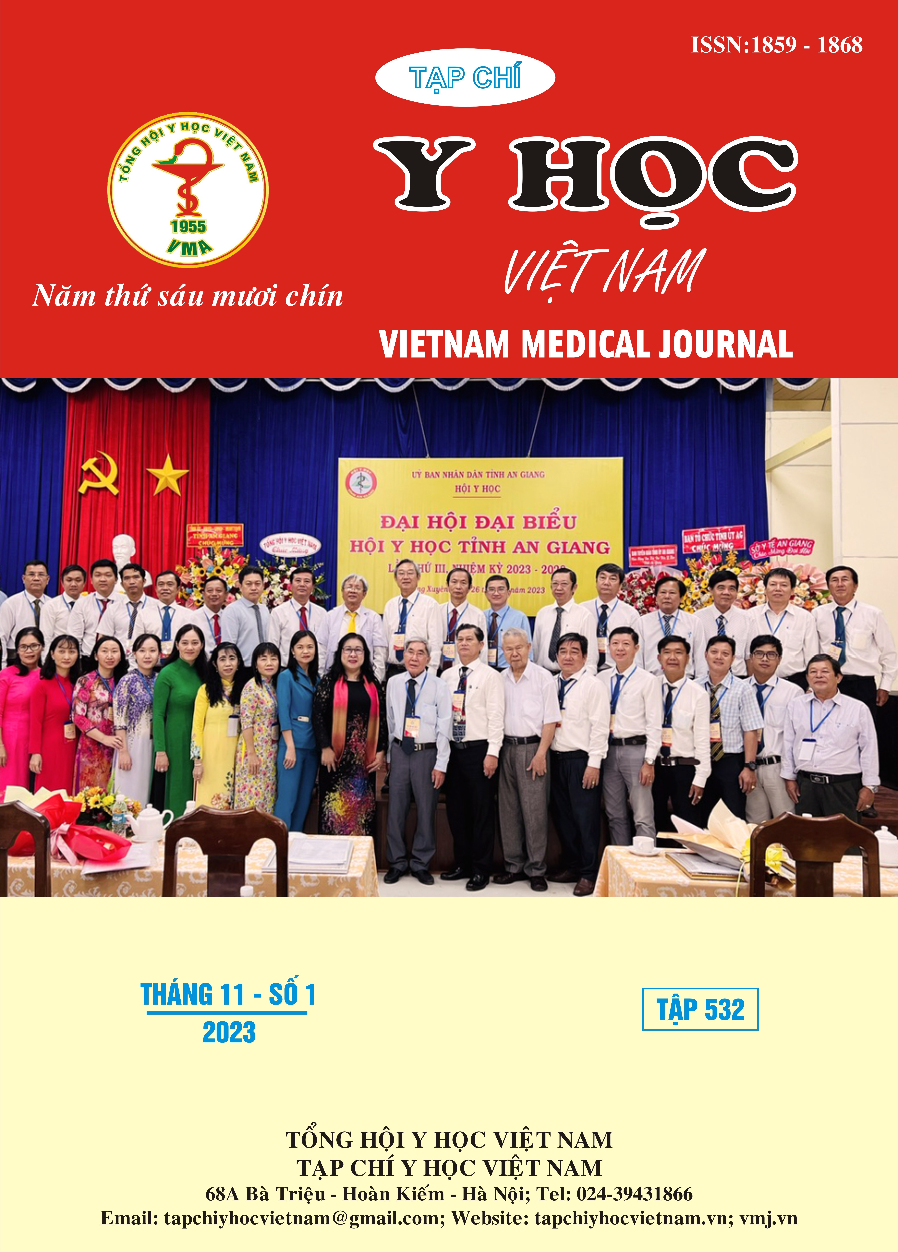EFFECTIVENESS OF MECHANICAL THROMBECTOMY IN PATIENTS WITH ACUTE ISCHEMIC STROKE DUE TO OCCLUSION OF THE M2 BRANCHES OF THE MIDDLE CEREBRAL ARTERY
Main Article Content
Abstract
Objectives: To evaluate the effectiveness of mechanical thrombectomy in patients with acute ischemic stroke due to occlusion of the M2 branches of the middle cerebral artery at Bach Mai Hospital. Subjects and methods: A cross-sectional descriptive study on 38 patients with acute ischemic stroke due to occlusion of the M2 branch of the middle cerebral artery who underwent mechanical thrombectomy at the Radiology Center of Bach Mai Hospital from January 2018 to June 2021. Results: The mean age of the patients was 70.5 years old, and the mean NIHSS score on admission was 14.26. After the intervention, 89% had good revascularization (TICI = 2b-3), and 57.89% had a good clinical recovery three months after discharge. The patients who came to the hospital early (within the first 3 hours from the onset) had a good clinical recovery rate three months after release, which was more than 2 times higher than those who came after 3 hours. The mRS score three months after discharge was significantly lower than on discharge. The rates of symptomatic intracranial hemorrhage, cerebral vasospasm, and ruptured thrombus causing distal embolism were low (2.63-5.26%), without other complications such as dissection or laceration of the vessels during the intervention process, hematoma, pseudoaneurysm in the groin areas. Conclusions: Mechanical thrombectomy achieved a high rate of good revascularization for treating patients with acute cerebral infarction due to occlusion of the M2 branches of the middle cerebral artery. Most patients had a decrease in NIHSS scores > 4 points and had a good clinical recovery three months after leaving the hospital. Short time to the hospital (within the first three hours from the onset) and recovery on discharge influenced good clinical recovery after three months. The complications such as symptomatic intracranial hemorrhage, cerebral vasospasm, and ruptured thrombus causing distal embolism were rarely seen.
Article Details
Keywords
mechanical thrombectomy, acute ischemic stroke, middle cerebral artery, Bach Mai hospital.
References
2. Park JS, Kwak HS. Manual aspiration thrombectomy using penumbra catheter in patients with acute m2 occlusion: a single-center analysis. J Korean Neurosurg Soc. 2016;59(4): 352-356. doi:10.3340/jkns.2016.59.4.352
3. Harsany J, Haring J, Hoferica M, et al. Aspiration thrombectomy as the first-line treatment of M2 occlusions. Interv Neuroradiol. 2020;26(4):383-388. doi:10.1177/1591019920925678
4. Coutinho JM, Liebeskind DS, Slater LA, et al. Mechanical Thrombectomy for Isolated M2 Occlusions: A Post Hoc Analysis of the STAR, SWIFT, and SWIFT PRIME Studies. AJNR Am J Neuroradiol. 2016;37(4):667-672. doi:10.3174/ ajnr.A4591
5. Vũ Đăng Lưu, Nguyễn Quang Anh. Kết quả của phương pháp lấy huyết khối bằng dụng cụ cơ học stent Solitaire trong điều trị nhồi máu não tối cấp. Tạp Chí Nghiên Cứu Y Học. 2015;(2):33-40.
6. Vũ Anh Nhị, Phạm Nguyên Bình. Đánh giá tính an toàn và hiệu quả phương pháp lấy huyết khối bằng dụng cụ cơ học Solitaire ở bệnh nhân đột quỵ thiếu máu não. Tạp Chí Y Học TP Hồ Chí Minh. 2014;(18):473-478.
7. Menon BK, Hill MD, Davalos A, et al. Efficacy of endovascular thrombectomy in patients with M2 segment middle cerebral artery occlusions: meta-analysis of data from the HERMES Collaboration. Journal of NeuroInterventional Surgery. 2019;11(11):1065-1069. doi:10.1136/ neurintsurg-2018-014678
8. Bhogal P, Bücke P, Pérez MA, Ganslandt O, Bäzner H, Henkes H. Mechanical Thrombectomy for M2 Occlusions: A Single-Centre Experience. INE. 2017;6(3-4):117-125. doi:10.1159/ 000458161
9. Mokin M, Primiani CT, Ren Z, et al. Endovascular Treatment of Middle Cerebral Artery M2 Occlusion Strokes: Clinical and Procedural Predictors of Outcomes. Neurosurgery. 2017;81(5):795-802. doi:10.1093/neuros/nyx060
10. Hao Y, Zhang Z, Zhang H, et al. Risk of Intracranial Hemorrhage after Endovascular Treatment for Acute Ischemic Stroke: Systematic Review and Meta-Analysis. Interv Neurol. 2017;6(1-2):57-64. doi:10.1159/000454721


